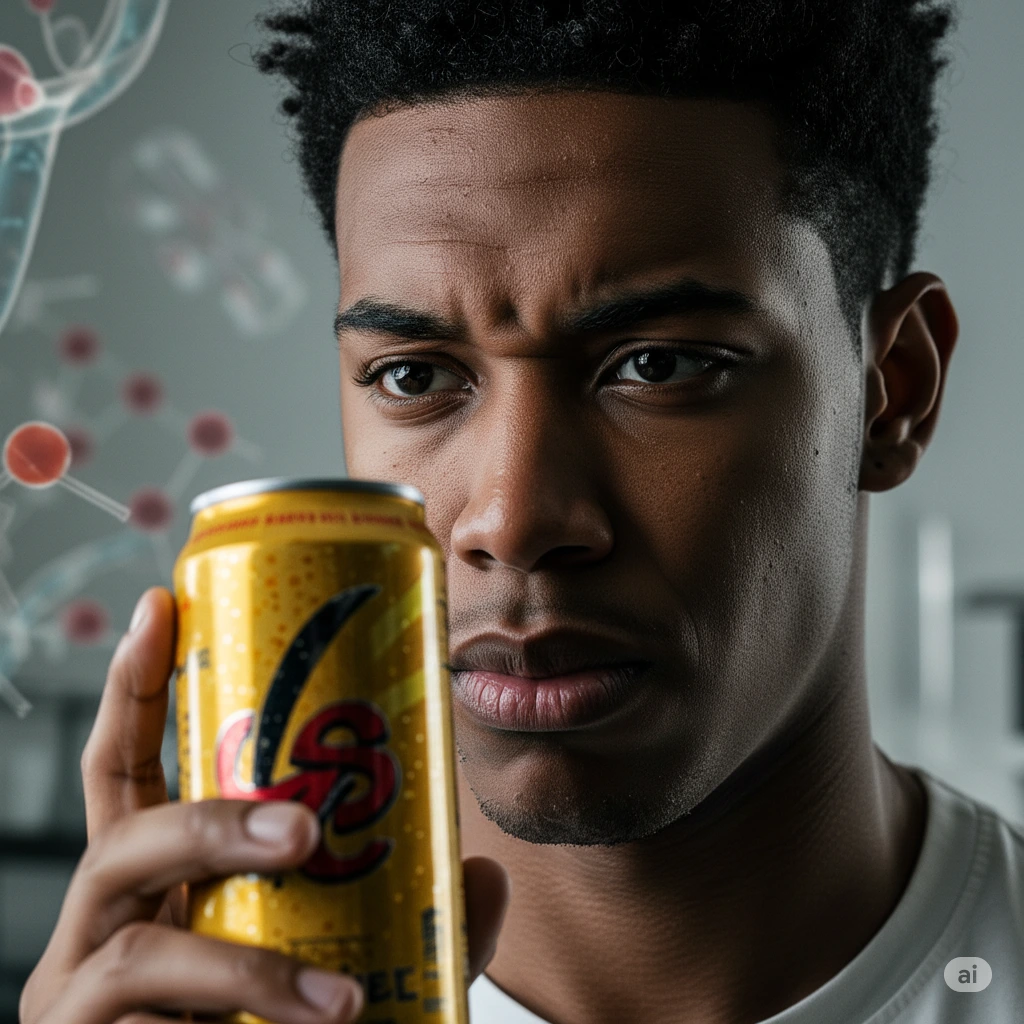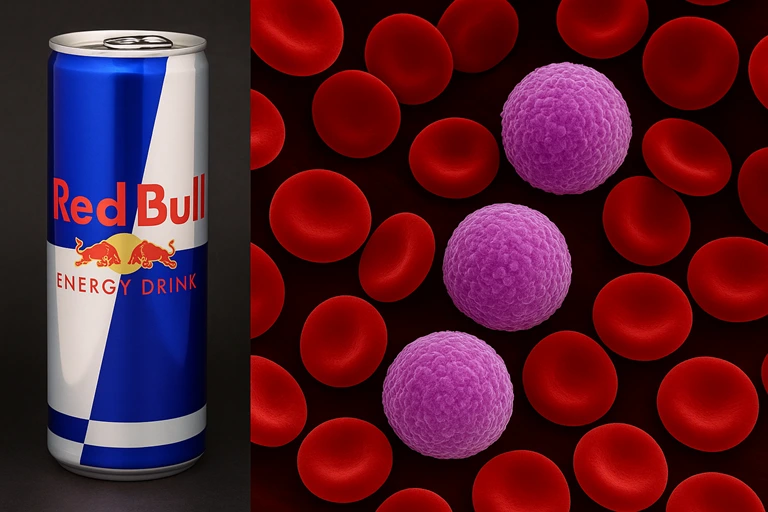Ever grab an energy drink for a pick-me-up? That jolt often comes with a hefty dose of taurine, an amino acid that’s also found naturally in our bodies and foods like meat and fish. For a long time, we’ve heard about its supposed benefits for energy and focus. Some folks going through cancer treatment have even taken it to help with chemo side effects. But hold on – some eye-opening new research is suggesting we might need to take a closer look at taurine, especially when it comes to blood cancer.
Scientists at the Wilmot Cancer Institute, part of the University of Rochester, have just published a study in the top-tier journal Nature, and it’s definitely got people talking. Their findings point to a worrying idea: taurine might actually be helping certain types of leukemia to grow and spread.

Here’s the gist of what they found. It seems that leukemia cells, particularly the nasty kinds that start in your bone marrow (like acute myeloid leukemia or AML, chronic myeloid leukemia or CML, and myelodysplastic syndromes or MDS), have a bit of a problem – they often can’t make their own taurine. So, what do they do? They get sneaky. These cancer cells have a special gateway (a protein called SLC6A6, if you want the technical term) that they use to suck up taurine from their surroundings in the bone marrow.
And once they’ve got that taurine? It’s like giving them extra fuel. The study suggests taurine helps these cancer cells ramp up a process called glycolysis. Think of glycolysis as the way cells break down sugar for energy. More energy for the cancer cells means they can grow faster and become more aggressive.
The lead researcher, Dr. Jeevisha Bajaj, and her team didn’t just stop at figuring this out. They experimented with blocking this taurine “fuel line” in mice and in samples of human leukemia cells. The results were pretty striking: when they stopped the cancer cells from getting taurine, their growth slowed down. On the flip side, when they gave taurine supplements to mice with leukemia, the disease progressed much faster – the risk of death was nearly three times higher.
Now, this is super important: the study isn’t saying taurine causes cancer. That’s a whole different ballgame. What it’s suggesting is that if leukemia is already there, extra taurine could be like throwing gasoline on a fire, helping the existing cancer to really take off.
Dr. Bajaj mentioned that these findings could open up new ways to treat these aggressive blood cancers by finding ways to stop leukemia cells from using taurine.
This news is particularly relevant for anyone who regularly chugs energy drinks or takes taurine supplements, especially if they have leukemia. The researchers themselves said we should “carefully consider the benefits of supplemental taurine in leukemia patients.” Even one of the study’s co-authors, Dr. Jane Liesveld, who is an oncologist, advised caution with high doses of taurine, as it seems it could encourage leukemia growth right where it starts – in the bone marrow.
It’s a bit of a twist, because taurine has often been seen in a positive light, even thought to have antioxidant benefits. But this research shows that its effects can really depend on the situation.
Of course, this is still early-stage research. A lot of the work was done with mice and cells in the lab. So, more studies are definitely needed to see exactly how this plays out in people with leukemia and to figure out the best way to potentially block taurine from helping cancer cells.
So, what’s the takeaway for you and me? If you’re downing energy drinks all the time, or thinking about taurine supplements, it might be a good idea to pause and think, especially if blood cancer is a concern for you or your family. And, as always, if you’re worried, the best person to chat with is your doctor. This study is a reminder that what we put into our bodies can have complex effects, and science is always learning more.
For years, taurine has been a staple ingredient in the booming energy drink market, touted for its potential to enhance athletic performance and mental alertness. It also occurs naturally in the body and is found in foods like meat and fish. Some cancer patients have even used taurine supplements to mitigate the side effects of chemotherapy. However, this new preclinical research presents a potential downside to this widely consumed compound, particularly for individuals with or at risk of myeloid leukemias.
The study, led by Jeevisha Bajaj, Ph.D., an assistant professor in the Department of Biomedical Genetics at Wilmot, discovered that leukemia cells, unlike healthy cells, often cannot produce their own taurine. Instead, they actively draw it from their surrounding environment in the bone marrow using a specific transporter protein encoded by the SLC6A6 gene. Once absorbed, taurine appears to promote a process called glycolysis, where glucose is broken down to produce energy, effectively feeding the cancer cells and helping them thrive.
Researchers observed that by using genetic tools to block this taurine uptake in mouse models and human leukemia cell samples, they could significantly slow down the growth of various myeloid cancers, including acute myeloid leukemia (AML), chronic myeloid leukemia (CML), and myelodysplastic syndromes (MDS). In mouse models, taurine supplementation was shown to significantly accelerate disease progression, with a nearly threefold higher likelihood of death in mice receiving taurine.
“We are very excited about these studies because they demonstrate that targeting uptake by myeloid leukemia cells may be a possible new avenue for treatment of these aggressive diseases,” Dr. Bajaj stated.
It is crucial to note that the study does not suggest that taurine causes cancer. Instead, it indicates that once leukemia is present, taurine can act as a fuel source, potentially making the disease more aggressive.
The findings prompt a re-evaluation of taurine supplementation, especially for individuals diagnosed with leukemia. The researchers explicitly cautioned: “Since taurine is a common ingredient in energy drinks and is often provided as a supplement to mitigate the side-effects of chemotherapy, our work suggests that it may be of interest to carefully consider the benefits of supplemental taurine in leukemia patients.”
While previous research has sometimes pointed to taurine’s antioxidant properties and potential benefits in other contexts, this study highlights that its role can be complex and context-dependent. Dr. Jane Liesveld, M.D., a Wilmot oncologist and co-author of the study, emphasized caution regarding high-dose taurine supplementation, noting that local levels of taurine in the bone marrow may enhance leukemia growth.
The scientific community acknowledges that these are preclinical findings, primarily based on animal models and cell cultures. Further research is necessary to fully understand taurine’s role in human leukemia patients, including investigating taurine levels in these patients and developing safe and effective methods to block its uptake by cancer cells.
Consumers, particularly those with existing health conditions or a family history of blood cancers, are encouraged to be mindful of their taurine intake from energy drinks and supplements and to discuss any concerns with their healthcare providers. This study underscores the importance of ongoing research into the complex interactions between dietary components and cancer progression.
While taurine is naturally produced in the body and found in foods like meat and fish, its supplementation in energy drinks is intended to enhance physical performance and alertness. However, this new evidence suggests that excessive taurine intake could have unintended health consequences, particularly for individuals at risk of or battling blood cancers.
Health experts advise caution in consuming energy drinks containing taurine, especially for those with or at risk of leukemia. Further research is needed to fully understand the implications and to develop guidelines for safe consumption.


